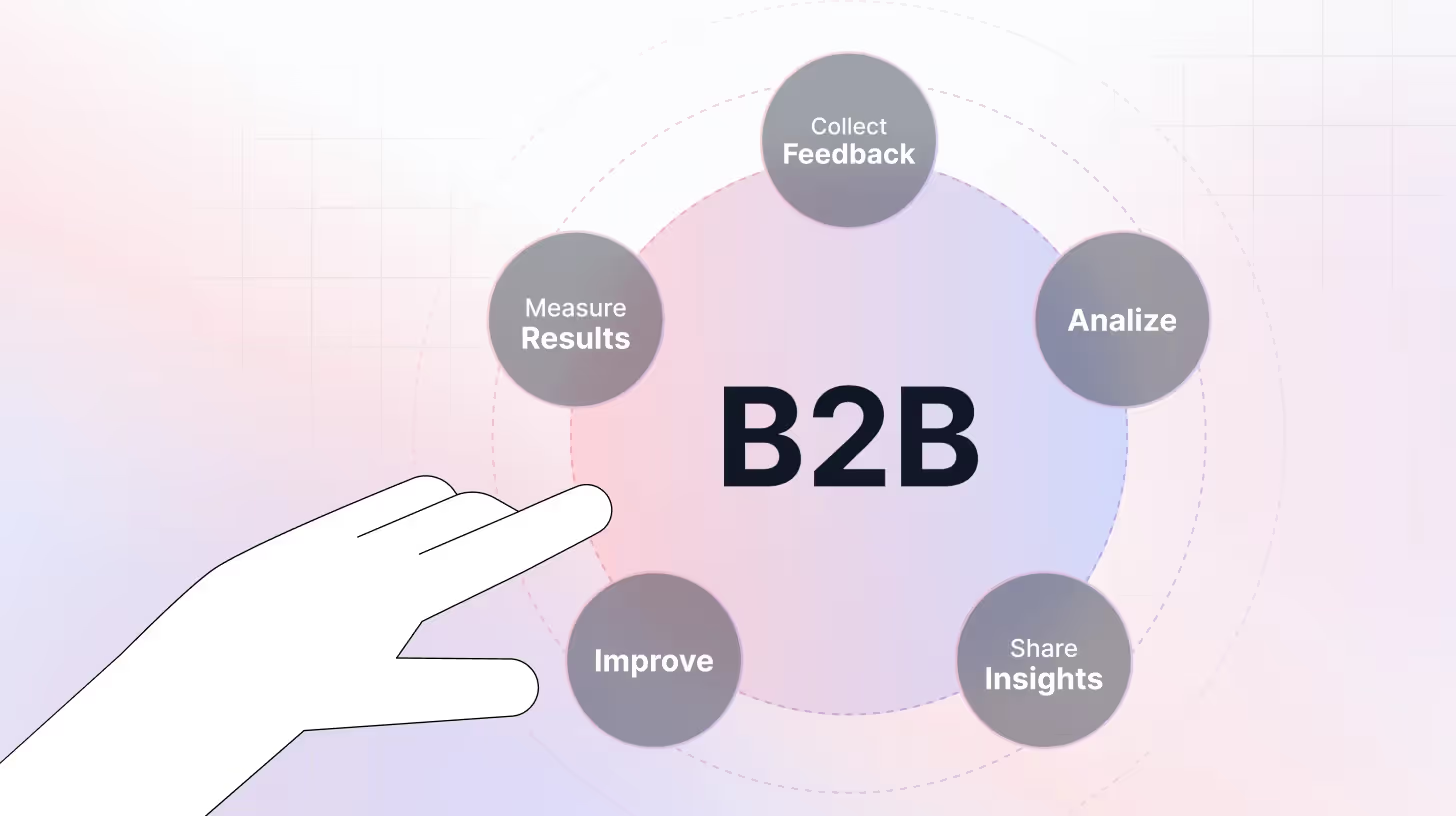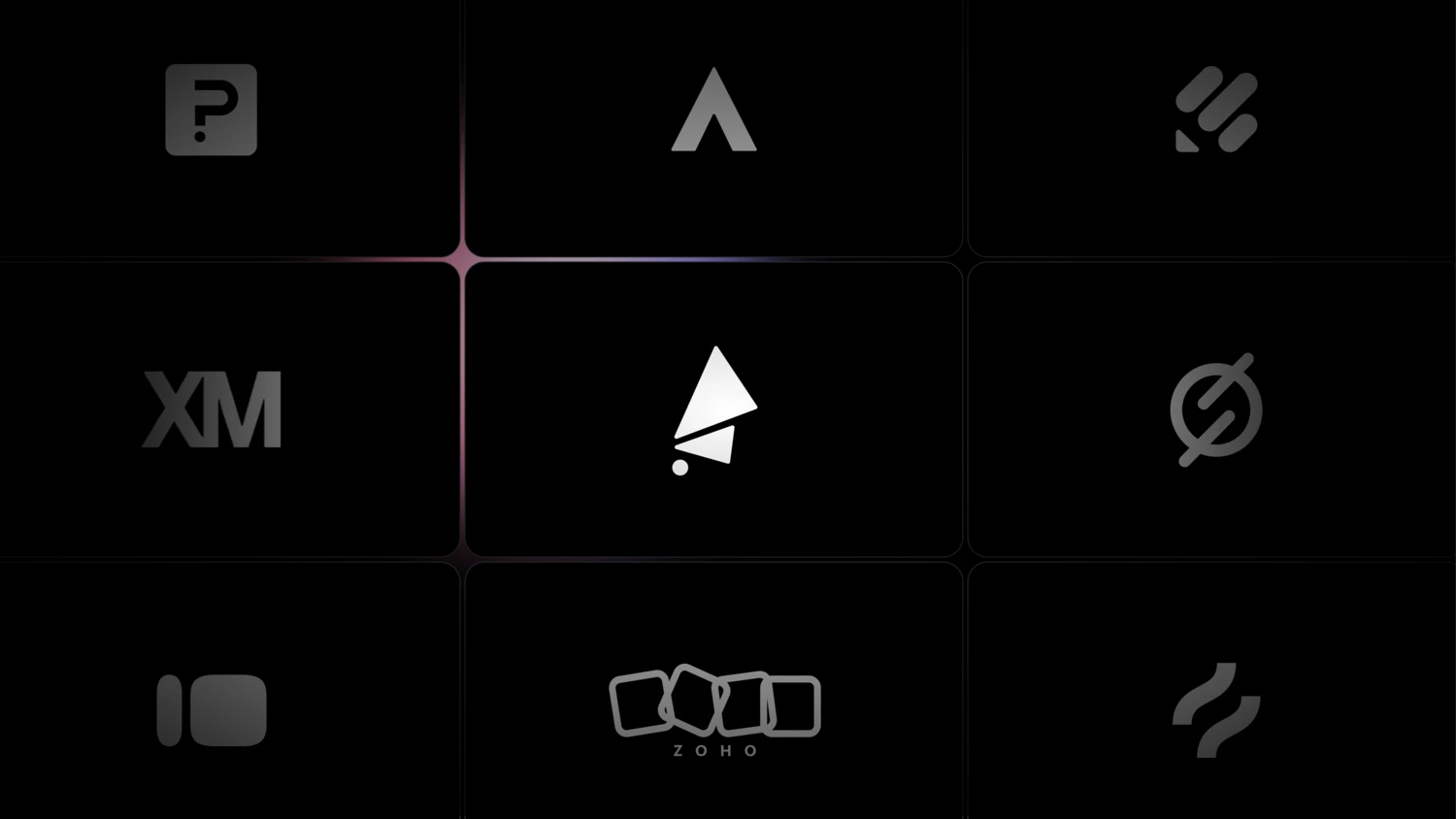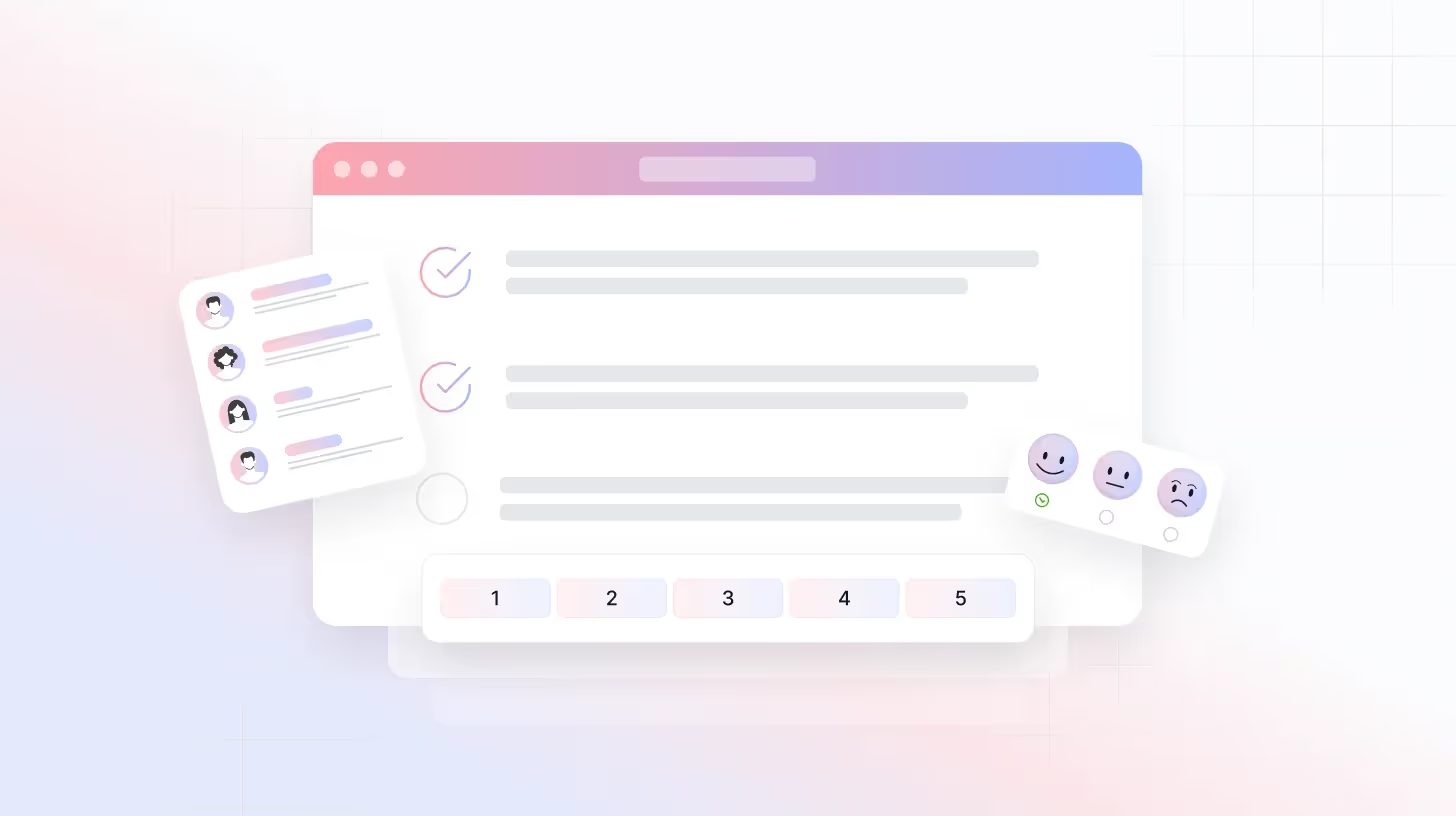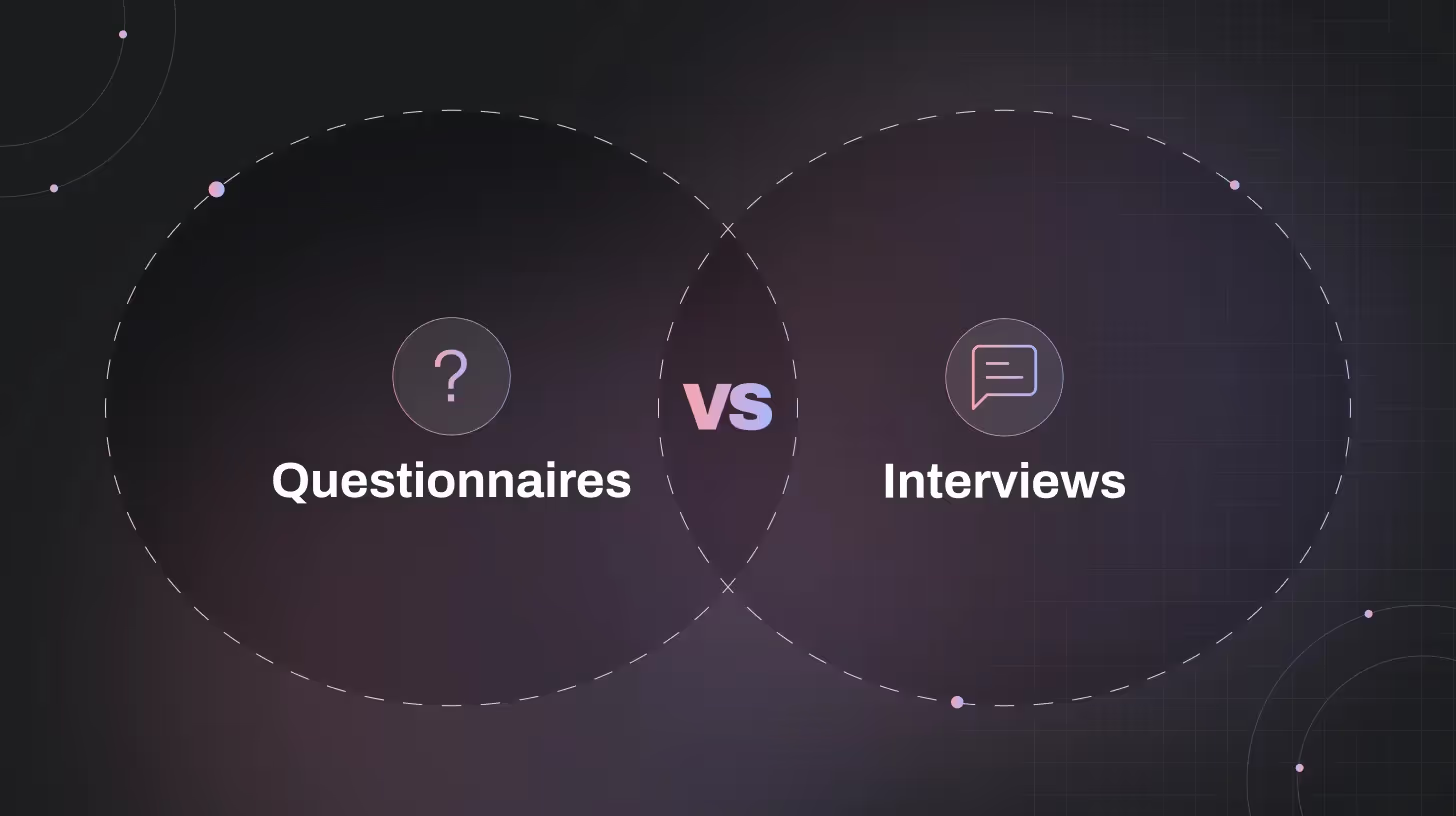B2B Marketing Survey 2026: Questions, Examples & Strategy Guide

The marketing team at a mid-market SaaS company had done everything by the book. Optimize their LinkedIn campaigns, host polished webinars, and automate nurture flows, but something was off.
Leads were pouring in, but conversions were flatlining, and ROI was dipping, but nobody knew why. So the team tried something they had never done before. Instead of digging through dashboards or guessing based on bounce rates, they launched a B2B marketing survey, targeting recent leads, lost deals, and even closed-won customers. And here’s what they discover:
- 40% of leads thought the product did something it didn’t
- The highest-converting content wasn’t the newest; it was a forgotten use-case blog
- One campaign brought in hundreds of leads… from the wrong industry altogether
With honest feedback in hand, the company refined its messaging, eliminated wasteful spending, and finally began marketing in a way that aligned with what their buyers wanted. It bridges the gap between what marketers think buyers want and what buyers want.
In this guide, we’ll show you how to create B2B marketing surveys that surface real insights, improve ROI, and connect marketing efforts to what your buyers actually care about.
What B2B Marketing Surveys Can Reveal That Analytics Can’t
We all love dashboard numbers that can show drop-off rates, open rates, or conversion declines, but they won’t tell you what’s going on in your buyer’s mind. That’s where B2B marketing surveys deliver gold by giving you direct insight into the thoughts, feelings, and motivations of your buyers. Here are a few things surveys reveal that analytics simply can’t:
Buyer Intent and Priorities
Analytics shows that a reader visited your pricing page three times, but a B2B marketing survey reveals what’s driving their interest.? Is it the budget? Or certain features they are interested in? Or they are concerned about implementation. These are the details you'll miss just by looking at clicks.
Which Channels Actually Deliver Quality Leads
Sure, ads might drive tons of traffic, but are those leads interested? B2B marketing surveys reveal how customers discovered you and what prompted them to engage. This way, you can shift your budget accordingly.
Messaging Effectiveness
Click-through rates might tell you which email subject line performed best, but surveys dig into whether the messaging aligns with the buyer’s pain points and language.
Why Buyers Drop Off
Analytics might show where buyers exit your funnel, but they don’t explain why. Surveys can help you uncover the real reasons behind drop-offs, such as confusing messaging, a lack of trust, missing features, or poor timing. By asking them directly, you can turn lost buyers into future opportunities.
Perception vs. Reality
Sometimes your internal team thinks the brand is “innovative and agile,” but buyers might see it as “complex and slow. These surveys reveal perception gaps that the company hadn’t realized from analytics alone.
Also read: B2B Customer Satisfaction Survey: Questions, Metrics, and Template

Top Use Cases for B2B Marketing Surveys to Boost Your ROI
Here are some common scenarios where B2B marketing surveys can transform your approach and boost results:
Pre-Launch Market Validation
Before investing in a full-scale campaign or product launch, surveys help you check if your idea, messaging, and positioning truly resonate with your target audience. T
Campaign Performance Feedback
After running a campaign, use surveys to understand how your audience experienced it. Did the messaging connect? Were the offers relevant? What channels worked best? This feedback helps you improve future campaigns with real user input rather than just relying on surface metrics.
Customer Journey Mapping
Surveys help you capture how buyers move through different stages—from awareness to decision, and what influences their choices at each step. This insight allows you to optimize content, touchpoints, and channels for better engagement.
Content Marketing Strategy Validation
B2B content marketing surveys help you understand what your audience actually wants to read, watch, or download. You can test blog topics, formats (webinars, whitepapers, videos), and even distribution preferences (email vs. LinkedIn vs. newsletters).
Brand Perception and Positioning
Knowing how your target market perceives your brand helps you position yourself effectively against competitors. Surveys reveal gaps between how you see yourself and how buyers see you, guiding messaging and branding updates.
Leads Quality and Qualification
Surveys can help you identify which leads are genuinely interested and ready to engage versus those just browsing. You can ask about their timeline, budget, and specific needs to prioritize outreach and align sales efforts better.
Win/Loss Analysis
B2B surveys are a powerful way to understand why deals are won or lost. Instead of relying on assumptions or vague CRM notes, win/loss surveys (or interviews) give you direct feedback from the source: your buyers.
Recommended read: Top Marketing Research Surveys to Drive Business Growth
30+ Powerful B2B Marketing Survey Questions to Ask in 2026
Use these expertly crafted B2B marketing survey questions to uncover buyer insights, refine your strategy, and drive better results in 2026.

Audience Segmentation and Buyer Persona Insights
Use these insights to refine your Ideal Customer Profile (ICP) and personalize marketing efforts.
Questions to Ask:
- What is your job title and key responsibilities in your role?
- What is the size of your company?
- Which KPIs are you responsible for?
- Are you involved in the purchasing process? (e.g., research, decision-making, approval)
- State the top challenges your team is facing currently.
- Does your company monitor industry trends regularly?
- What is your typical buying timeline for solutions in this category?
Messaging and Value Proposition Feedback
Validate what resonates and what falls flat before scaling campaigns.
Questions to Ask:
- How well do you understand what our company offers after visiting our website or seeing our ad?
- What part of our value proposition resonated most with you?
- Was our messaging aligned with your needs or priorities?
- What part of our message felt unclear or generic?
- What would have made our offer more compelling?
- How clearly did we communicate the benefits of our solution?
Brand Awareness & Perception
Track brand recall, positioning, and perception to guide marketing strategy.
Questions to Ask:
- What feedback have you received about our brand image?
- How important is brand reputation in your buying decisions?
- Which channels most influence your perception of a brand?
- How would you describe our brand in a few words?
- How do you perceive us compared to other companies in the same space?
- How would you rate your trust in our brand?
- What do you believe sets us apart from competitors?
Win/Loss Analysis Questions
Learn from lost deals and double down on what wins buyers over.
Questions to Ask:
- What were the top reasons you chose [or didn’t choose] our product or service?
- What alternatives did you consider during your decision process?
- How did our pricing compare to competitors?
- Was there anything that made you hesitate during the buying process?
- What would have changed your decision?
- Would you consider us again in the future? Why or why not?
Lead Quality and Attribution
Identify which sources drive the best-fit leads so you can optimize your budget.
Questions to Ask:
- How did you first come across our brand? (e.g., LinkedIn, search, email, referral)
- What motivated you to engage with us today?
- Which of our marketing materials or campaigns influenced your decision to reach out?
- On a scale of 1–10, how relevant was our message to your current business needs?
- What specific information or offer convinced you to take the next step?
Pro Tip: Use a mix of multiple-choice, Likert scale, and open-ended questions to capture both quantitative and qualitative feedback. And for scalability, consider using AI survey platforms like TheySaid to automate collection and analysis.
Also read: B2B Survey Provider: What to Look for
Create Your B2B Marketing Survey in Minutes with TheySaid
With TheySaid, you can create and launch smart, conversational business-to-business marketing surveys in just a few minutes without needing a research team or technical setup.
Here’s why marketers are using it
- AI-Generated Questions tailored to your goals (content feedback, win/loss, persona insights, etc.)
- Real-Time Analysis to spot trends, friction points, and buying signals
- Multiple Publishing Options: Embed on landing pages, email, social, or share a link
- Smart Segmentation: Filter responses by role, industry, or buyer stage
- No-Code Setup: Build and launch surveys in minutes, not days
When every question feels like a one-on-one conversation, you’re not just gathering answers; you’re striking insight-rich gold faster than ever.
Start your first AI-powered B2B marketing survey now.
Key Takeaways
- Surveys give you answers analytics can’t, like why leads bounce or how your message lands.
- B2B marketing surveys go beyond forms; they shape your content, messaging, positioning, and win/loss strategy.
- Use different questions for different goals, from persona insights to campaign attribution, and tailor your survey by use case.
- AI surveys and interviews = speed + depth, ask smarter questions and get richer responses in less time.
- Tools like TheySaid make it easy to build, launch, and analyze surveys without a research team or clunky platforms.
Bottom line
Most teams are running campaigns without really knowing what their buyers think. A simple B2B marketing survey can change that. With TheySaid, you can ask smarter questions, have AI-powered conversations, and get clear, actionable insights without needing a research background. It’s the easiest way to make your marketing more relevant and effective.
FAQs
What are the common mistakes to avoid in B2B Marketing surveys?
- Asking too many questions
- Using vague or biased wording
- Not segmenting your audience
- Ignoring open-ended feedback
- Failing to act on results
- Sending surveys at the wrong time
When is the best time to conduct a B2B Marketing survey (and how often)?
Run a B2B marketing survey after major events like:
- A product launch
- A marketing campaign
- A lost deal
- A high-intent demo or trial
- A content asset download
As for frequency, aim to do a larger, strategic survey quarterly, and use shorter pulse surveys more frequently to gather ongoing insights.
How many questions should a B2B Marketing survey include?
Keep your survey between 5 to 10 questions. Long surveys kill completion rates.
- For quick feedback (e.g., content reactions), 3–5 questions is enough.
- For deeper insights (e.g., win/loss or buyer persona), 7–10 well-crafted questions work best.
Can I use B2B marketing surveys for win/loss analysis?
Absolutely. Win/loss surveys are one of the highest-impact use cases. They help you understand what swayed a buyer’s decision pricing, features, sales experience, or perception gaps.
What are some good examples of B2B Marketing survey questions?
- Was our value proposition clear and relevant to your needs?
- What part of our message felt unclear or generic?
- Where did you first hear about us?
- Which of our campaigns influenced your decision to engage?














.svg)